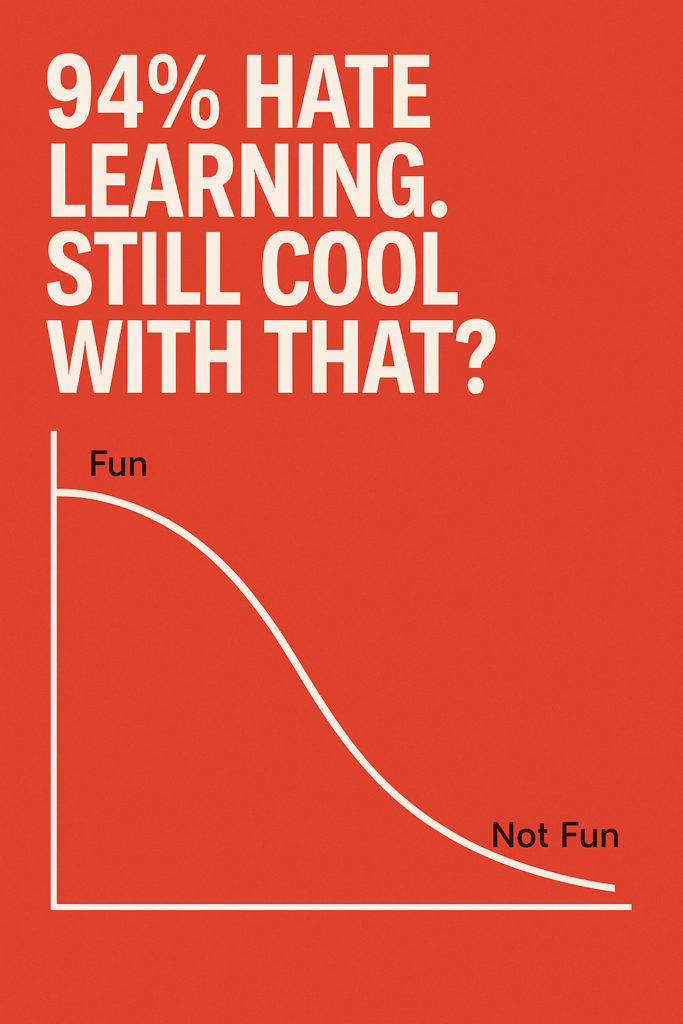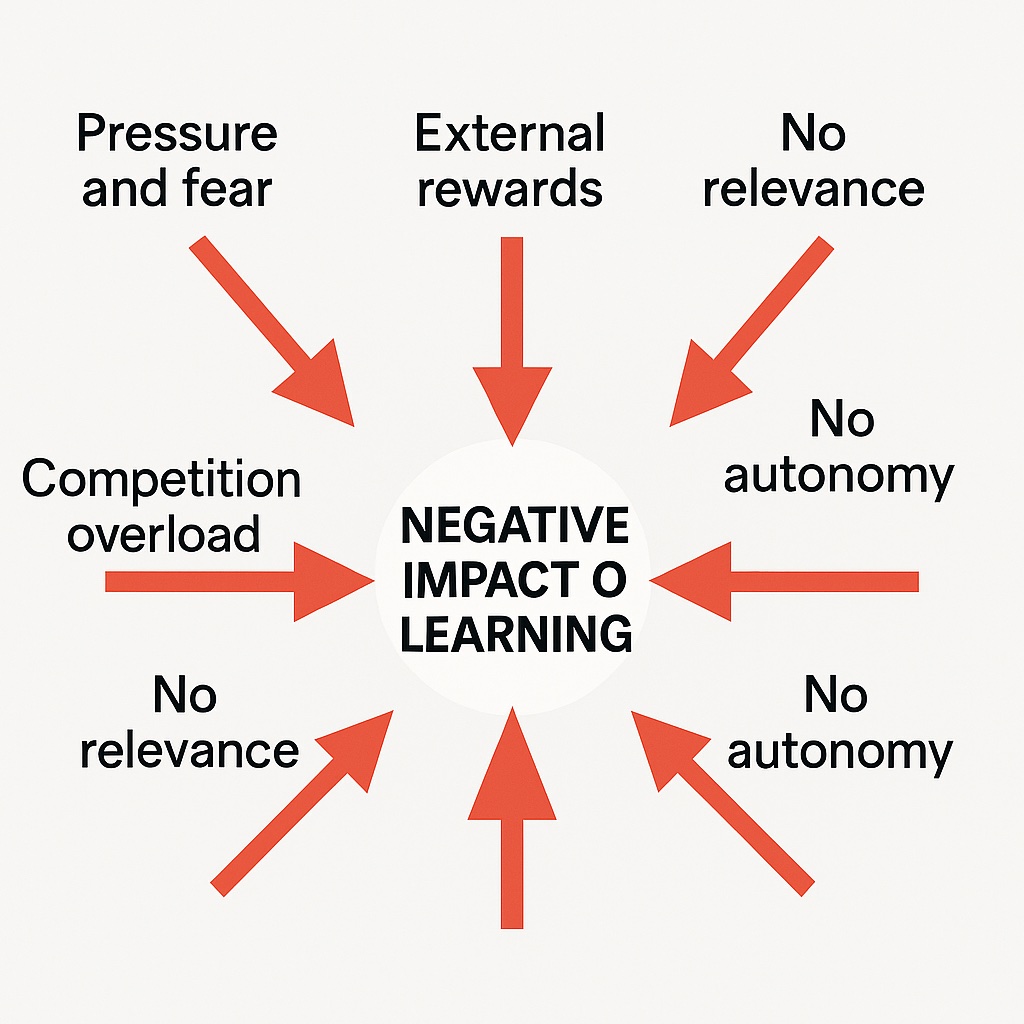Where did all the joy go?
Remember the spark in the eyes of a first grader? The endless curiosity? The excitement to learn? By Grade 7, most of that is gone. A 2025 UK-wide study confirms this disturbing trend: pupils’ enjoyment of school drops substantially by the end of Year 7 [1].
This isn’t news, either. A 2013 study showed the same pattern: while over 50% of six-year-olds said that learning is always fun, only 6% of thirteen-year-olds agreed [2]. That’s not a dip. That’s a crash landing.
Yes, the study is over ten years old. And yes, it was sponsored by Scoyo – a Lernsoftware company, likely not unhappy to make school look worse. But let’s be honest: time and a global pandemic probably haven’t improved the numbers.
So what’s stealing the joy? And how do we get it back?
Now imagine this: if 94% of employees told a CEO they hated coming to work, the CEO would be fired. The board would panic. Stock prices would crash. Consultants would earn a fortune trying to fix it. So why do we accept such numbers in schools? Is it ignorance? Tradition? A collective case of learned helplessness?
In this post, we’ll explore what happens to enthusiasm in school, why it fades, and how we can bring it back. We’ll dive into research, call out common traps in our education systems, and show how platforms like enduri help learners explore learning as an enthusiastic and fun challenge. Yes, there’s even a “favorite joke” feature in every Learner ID. Because humor matters. And no, it doesn’t lower the grades.

The enthusiasm crash: What studies say.
Let’s start with the data.
The above mentioned study shows that while more than half of children under 7 say learning is fun, only 6% of 13-year-olds agree [2]. In the U.S., the “Middle School Slump” is backed by a long-term study from the University of Virginia, involving 100,000 students: motivation and confidence nosedive in Grade 6, and only partially recover later [3]. And OECD’s 2023 Education at a Glance report? It’s not pretty: over 60% of students in secondary schools report feeling unmotivated or disengaged, especially in highly standardised systems [8].
Again: if 94% of employees said they hated coming to work, we wouldn’t shrug – we’d riot. So why do we let this slide in education?
What’s killing the joy?
Presssure, fear and stress
Nope, it’s not just ignorance. It’s systemic. Here are a few of the usual suspects:
- Pressure and fear: When learning becomes a treadmill of grades, corrections, and comparisons, joy gets squeezed out. Neuroscientist Gerald Hüther explains: enthusiasm activates brain growth. Stress shuts it down [4].
- External rewards vs. inner motivation: Children are naturally curious. But when learning is tied to bribes (stickers, grades, chocolate?), the message is: this must be awful if we need to sugarcoat it. Only 4% of children retained information better when motivated by external rewards [2].
- Competition overload: Stern calls it “destructive competition.” Instead of growing together, students are measured against each other in rigid rankings. The result? Fear of losing. Or worse—apathy [5].
- No relevance: If students can’t see why something matters, they won’t care. Learning feels pointless if it’s disconnected from the real world. Research shows kids retain information better when it’s embedded in stories or tied to personal interest [6].
- No autonomy: Most schools offer little choice. And especially during adolescence, this leads to passive resistance. Teens are wired to want control—and if they don’t get it in learning, they’ll get it elsewhere (hello, TikTok).
- Fun not allowed: School is often treated as the opposite of play. But play isn’t a distraction. It’s the most natural way to learn. Stern puts it best: “There’s no better engine for learning than play” [5].

“Success is a side effect of enthusiasm”
André Stern – A Special Approach
“Success is a side effect of enthusiasm.” This isn’t an Instagram mantra. It’s one of my favorite quotes and belongs to the French author and educator André Stern. Stern is known for his unconventional upbringing and radical views on learning. He never went to school. Yep, you read that right.
Born in 1971 in Paris, son of educational researcher Arno Stern, André was never formally schooled. Yet he grew into a respected speaker, writer, musician, and what he calls an “ambassador of childhood.” Stern believes that children are born to learn – and that joy is their most powerful engine. Lose the joy, and you lose the engine. If we looked at most Year 7 students through Stern’s lens today, the tank would be dangerously close to empty. Or, as legendary football coach Giovanni Trapattoni once described the poor performance of his players: “Schwach wie eine Flasche leer!” (Weak like an empty bottle!)
Learning to learn: A better way forward
Skills instead of content
How do we fix this? First: stop stuffing heads with content. Start teaching kids how to learn.
Metacognition – the ability to reflect on one’s thinking – is more predictive of academic success than IQ. According to John Hattie’s meta-analysis of over 800 studies, metacognitive strategies are among the top 10 most effective interventions in education [7].
We also need to:
- Make learning relevant. Connect content to real life.
- Celebrate mistakes. Learning is trial and error.
- Play more. If it’s boring, it’s not working.
- Trust students. Autonomy leads to ownership.
What I’ve seen as founder of enduri
As a former teacher and founder of enduri, I’ve seen one thing time and again: enthusiasm is rocket fuel for learning. I remember a 12-year-old who had been labelled “lazy.” All it took was discussing with him how he likes to learn. No one had asked before. His whole posture changed. He lit up – and showed a never-imagined eagerness to learn. Or the quiet student who stood in front of her class explaining her learning method, because it was hers – not someone else’s worksheet. When students feel seen and supported, performance often improves almost by accident. (But only almost. The science backs it up [1][2][3][4][5][6]7][8][9].
How enduri brings back the fun
Why is 6 afraid of 7?
At enduri, we believe enthusiasm isn’t optionai. It’s the whole point. Our platform helps students discover how they learn best. They create their own Learner ID – a personal learning profile that includes learning style, goals, favorite topics, and yes… their favorite joke. Why jokes? Because humor opens doors. Imagine a one-to-one coaching session. Instead of starting off with criticism of last week’s homework, it starts with a shared laugh. What a difference! What a positive start to a serious homework talk! (Best math teacher joke: Why is 6 afraid of 7? Because 7 ate 9!)
enduri also provides short, impactful videos, personalized strategy suggestions, and a motivation tool that helps students track their learning in a way that’s transparent and empowering – not judgmental. Teachers get insights. Students get ownership. Everyone wins.
Enthusiasm: a shortcut to success
Motivation and excitement als learning accelerator
When kids are excited, they remember more, stay resilient, and perform better. Period. A meta-review from the Education Endowment Foundation links motivation with higher retention and academic growth [9]. And it’s infectious. If teachers light up, students follow. If parents model curiosity, kids do too. Let’s be clear: André Stern’s no-school path isn’t for everyone. But it’s deeply inspiring. So no, you don’t need to cancel school. But what if we reimagined it? Let’s build learning environments where enthusiasm isn’t a side note – it’s the strategy.
Your turn
What’s your experience with joy and learning?
Have you seen that spark in a student’s eyes – or lost it? What brought it back? We’d love to hear from you. Share your story, your questions, or your best joke.
Become enthusiastic—now.
Sources:
- Herald Scotland – “Pupils’ enjoyment of school suffers substantial decline by Year 7.” (2025)
- DPA/Scoyo – “Studie: Belohnungen machen für Kinder das Lernen nicht leichter.” (2013). Additional link and comment:
- Audrey Breen – “Research: The Middle School Slump Is Real.”(2024)
- Prof. Gerald Hüther – Interview on brain enthusiasm, development and motivation.(2012)
- André Stern‘s homepage including several texts, blogs and publications.
- The Learning Scientists: Learning “Useless” Things in School is (Usually) NOT Useless (2020)
- John Hattie – “Visible Learning.”(updated November 2024)
https://www.visiblelearningmetax.com - OECD – “Education at a Glance 2023.”
https://www.oecd.org/education/education-at-a-glance - Education Endowment Foundation – “Teaching and Learning Toolkit: Metacognition and Self-regulation.” (last update May 2025)
https://educationendowmentfoundation.org.uk/education-evidence/teaching-learning-toolkit/metacognition-and-self-regulation

